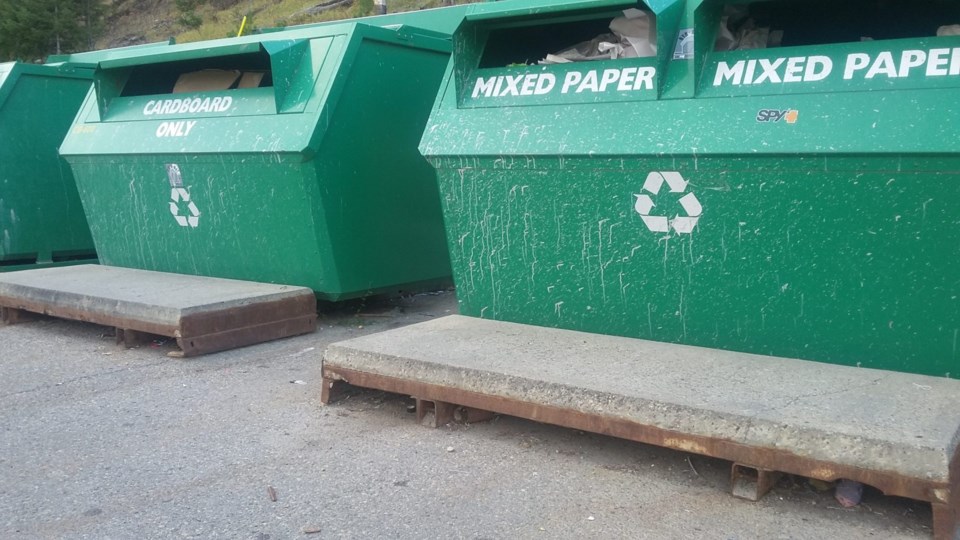Scott Hayes | [email protected]
Local Journalism Initiative Reporter
Changes are coming to JasperÔÇÖs recycling program after council approved the purchase of a dedicated residential plastics recycling trailer during its June 27 meeting.
Council also approved converting the Activity Centre Parking Lot Recycling Depot into residential use only while the S-Block Recycling Depot will become dedicated to industrial, commercial and institutional (ICI) users. 
The changes are set to take place within the next few months after public notice. 
It means that the costs associated with JasperÔÇÖs recycling program should decrease. Currently, the 2023 utility budget shows expenses of approximately $480K to support the municipalityÔÇÖs recycling program although that figure isnÔÇÖt broken down as to which portion is related to residential and which is commercial, said Chief Administrative Officer Bill Given.
ÔÇťIn Jasper, our recycling streams are mixed. We have this depot system where residents and businesses drop off their recycling. That won't work under this new system; we have to have a clear way to understand what is residential recycling and what is commercial recycling,ÔÇŁ he said.
ÔÇťWe need to separate our streams so that we can clearly understand the cost of each stream.ÔÇŁ
These separate costs are important to understand before April 2024. There's a great deal of uncertainty about how it will work, Given said, because theyÔÇÖre building the system as theyÔÇÖre going along.
CouncilÔÇÖs decision was prompted by a recent Alberta law on extended producer responsibility (EPR) for products through their lifespan.┬á
ÔÇťThe impact of that is that municipal recycling programs will have to change in response to this,ÔÇŁ Given said.
ÔÇťThat is a very positive thing for Albertans, because it means that rather than people having to pay all of the costs of recycling either through their property taxes or through their utility bills, some of the money will come in to support recycling from these outside parties: the people who are making the products and profiting off them in the first place.ÔÇŁ
Separating the two is a key facet toward establishing the new system.
This is because the provincial rules will require producers to deal with post-consumer products in the residential recycling stream, specifically focusing on paper and plastics.
Materials that are not residential in nature will be considered contamination by the processors and a penalty will be incurred if the percentage of ICI/residential material is exceeded. The allowable percentage of contamination has not yet been determined, but in the recycling industry 10 per cent is typically the limit.
Alberta will have two systems for extended producer responsibility: one for single-use products, packaging and printed paper products (PPP) and the other for hazardous and special products systems (HSP). The Alberta Recycling Management Authority is the designated organization that will provide oversight of both.
A third party study estimated that Alberta municipalities collect and process 197,600 tonnes of recyclable packaging and paper products from households at a cost of about $107 million, as reported on the provinceÔÇÖs .
As of 2022, it cost the municipality approximately $500 per bale to collect and process cardboard, for example. An average of 10 bales per week were collected during the summer months and four bales per week during the rest of the year. Each bale weighs approximately one metric ton.
Currently, administration estimates that 60 to 80 per cent of plastics and more than 70 per cent of cardboard and mixed paper by volume come from the ICI sector.
One of the challenges that administration has seen, Given said, is that there really is no commercial glass recycling available for non-refundable items.
Producers will be required to provide verification of collection and management plans to the ARMA by April 1, 2024. EPR systems for PPP and HSP will be operational by April 1, 2025. 
ÔÇťBeginning in 2025, producers will have to either pay to have certain kinds of residential recycling collected, and then they'll have to deal with the costs of processing those waste products, or they will have to actually collect the residential recycling,ÔÇŁ Given said.
Part of councilÔÇÖs decision was to purchase a new plastics trailer with smaller and more restrictive openings that would prevent oversized commercial plastics from being deposited. It would also involve securing the perimeter of the recycling area with the possibility of having staffed hours of operation.




